Undoubtedly, oat flour is one of the most nutritious and healthiest sources of carbohydrates. But there are still some people who do not love oat flour and look for the oat flour substitute. If you are the one seeking an alternative, then you are in the right place.
In this article, we are going to describe some amazing information on oat flour as well as the substitutes for oat flour briefly. So stay with us till the end not to skip any single important information that you are craving.
Table of Contents
What is oat flour?
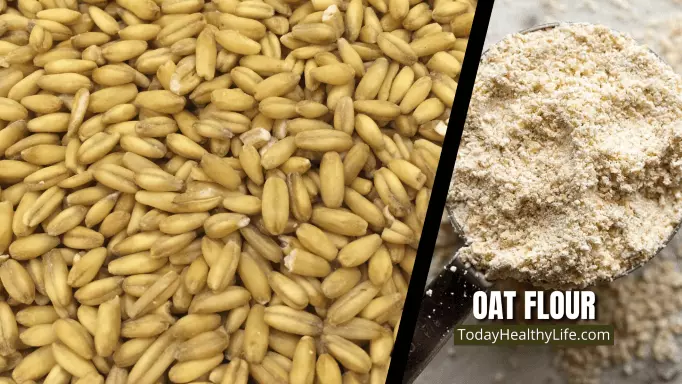
Basically, oats are a species of cereal grains. It is one of the most suitable foods for both humans and animals. Oats have versatile uses. Among them, oatmeal, oat milk, and oat flour are very common.
Oat flour is made from rolled oats that come from whole grain oats. It is off-white in color compared to plain flour. It has a subtle sweet taste with a slightly nutty flavor. This flour is used to make different baking recipes that you can eat at your breakfast. And also, it is gluten-free and very safe for your health.
Most people love the flour that comes from ground oats. But few people like steel-cut oats flour. Because this flour is very high in dietary fiber and has extreme liquid absorbent power. Also, it is an enormous source of carbohydrates, protein, fat, vitamins, and minerals.
Oat flour calories
In order to maintain our body fitness, we should know how many calories a food contains. As oat flour comes from the oat grain, 125 grams or one cup of oat flour contains 455 calories. It is high in calories. But, still, it is an ideal source of energy because of having some amazing nutrients.
Oat flour nutrition
Oat flour is highly nutritious. It is an important source of fiber, vitamins, and minerals. Because of this, you can keep whole grain oat flour like bread, pancake, and other baked foods in your diet chart. According to the USDA, 104 grams contains the following nutrients-
| Nutrients | Amounts per 104 grams |
| Carbohydrate | 68.3g |
| Protein | 15.3g |
| Fat | 9.5g |
| Fiber | 6.8g |
| Sugars | 0.83g |
| Phosphorus | 470.8mg |
| Potassium | 386mg |
| Magnesium | 149.76mg |
| Sodium | 19.8mg |
| Manganese | 4.18mg |
| Iron | 4.16mg |
| Zinc | 3.33mg |
| Copper | 0.45mg |
| Calcium | 57.20mg |
| Selenium | 35.36mcg |
| Lutein and Zeaxanthin | 187.20mcg |
| Vitamin B1 (Thiamin) | 0.72mg |
| Vitamin B2 (Riboflavin) | 0.130mg |
| Vitamin B3 (Niacin) | 1.53mg |
| Vitamin B5 ( Pantothenic Acid) | 0.209mg |
| Vitamin B6 | 0.130mg |
| Vitamin B9 ( Folate, DFE) | 33.28mcg |
| Vitamin E | 0.73mg |
| Vitamin K1 | 3.3 mcg |
| Betaine | 31.9 mg |
| Choline | 31.1mg |
Is oat flour healthy?
Yes, of course. Oat flour is nutritious whole grain flour. It is slightly nutty but does not contain gluten content. However, oat flour has some impressive health benefits when it comes in the form of bread, pancakes, muffins, and other delicious foods.
Now let’s have a look at some of the potential health benefits of oat flour;
- Provide enough energy and nutrition
- Work like an immunity booster
- Can satisfy your appetite
- Reduce the risk of cardiovascular diseases
- Lower the cholesterol level in the blood
- Help to control diabetes by reducing blood sugar level
- Keep blood pressure normal
- Prevent deterioration of premature body cell
- Lower the risk of cancer
- Improve the bone, skin, and hair health
- Eliminate mental stress and hypertension
- Help to minimize the possibility of developing Asthma
- Prevent constipation, and diarrhea
- Very helpful in weight loss
Oat flour substitute
The fiber-enriched oat flour is able to fulfill the requirement of enough carbohydrates in your daily life. Also, oat flour is uniquely a great source of vitamins and minerals.
However, oat flour is becoming popular day by day because it is gluten-free and healthy. But if you are still not convinced, there are so many alternatives to oat flour. In this section, we will discuss some major substitutes for oat flour.
Brown rice flour
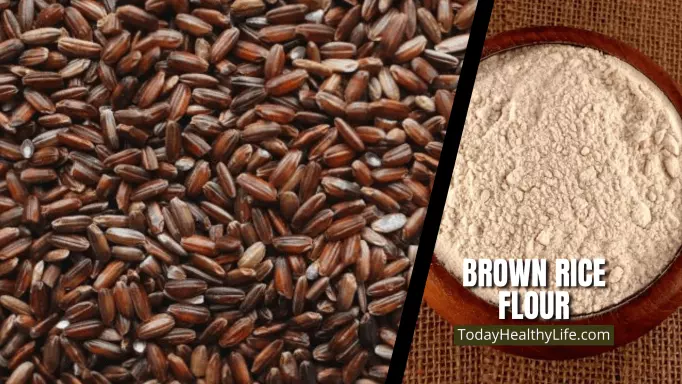
Brown rice flour is prepared from the extreme quality of whole grain brown rice and 100% stone ground. The color of this flour is darker, and the texture is quite smooth. It has a slightly nutty flavor and doesn’t have gluten content. That is why brown rice flour is the best substitute ever for oat flour.
Basically, 100 grams of brown rice flour delivers 366 calories. It contains 80g of carbohydrates which is a huge source of energy. This flour is enriched in dietary fiber, vitamins, and minerals too. So, unquestionably, this flour can keep your heart and bone safe and healthy. Moreover, it can reduce death from heart diseases.
Brown rice flour is very famous for making thickening gravies and sauces, and most importantly gluten-free baking recipes: pancakes, gluten-free bread, and muffins. Therefore, take ¾ cup of brown rice flour to substitute for a cup of oat flour.
Also read: Glutinous rice flour: nutrition, is it gluten free? substitute, & all.
Almond flour
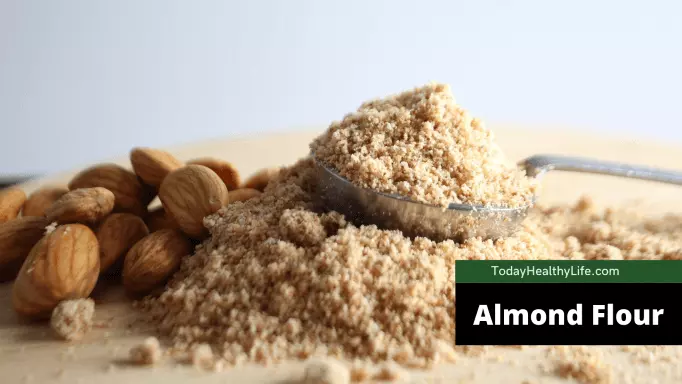
Almond flour is a nut-based flour, so simply it will have a nutty flavor. It is one of the best oat flour substitutes that are obviously gluten-free. This flour is very similar to oat flour. When you use almond flour for baking, you will see that this flour acts the same as oat flour but you will find the taste is different.
112 grams of almond flour provides 648 calories. Like oat flour, almond flour is a fiber-enriched flour but contains more fat than oat flour. It is another good source of vitamins and minerals. You can eat almond flour by making pancakes, bread, scones, pasta, cookies, brownies, pudding, muffins, etc. However, take one cup of almond flour to replace one cup of oat flour when substituting.
Almond flour has so many health benefits. This flour is rich in Vitamin E and several antioxidants. Therefore, it is needless to say that almond flour can reduce the risk of heart diseases, stroke, cancer, diabetes, and so on. This flour also helps by lowering the risk of Alzheimer’s disease. Besides all of these, almond flour is one of the best flours for losing weight. It contains low carbs and an incredibly low glycemic index that help to minimize the sugar level of your blood. As a result, you can lose weight surprisingly.
Coconut flour
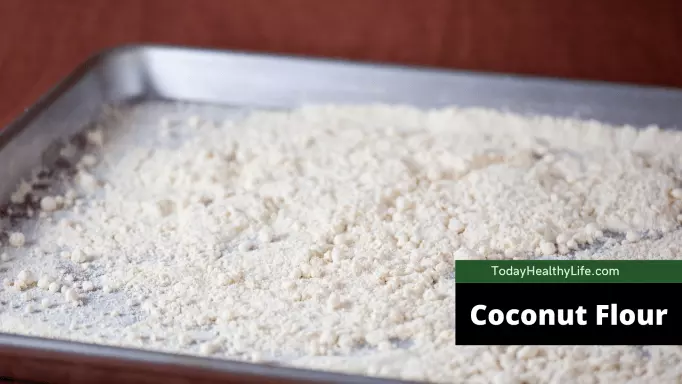
Coconut flour is produced as a byproduct during the production of coconut milk from dry and ground coconut meat. It is completely gluten-free. This flour does not only contain high fiber but also is an amazing source of protein. 28 grams of coconut flour delivers 120 calories with low carbohydrates, abundant potassium, and iron.
It gives a very delicious aromatic flavor to baking food. You can add coconut flour wraps, brownies, muffins, coconut layer cakes, vanilla almond sugar cookies, etc. to your diet chart. However, use one cup of coconut flour to substitute over a cup of oat flour.
Coconut flour is a type of flour that has some blessing health benefits. It can keep blood sugar stable to control diabetes. Moreover, having this flour in your diet chart can ensure a healthy body with a healthy weight. The high fiber of this flour helps the proper digestion of food. Furthermore, enough potassium keeps your heart safe and sound.
Amaranth flour

Amaranth flour is made from amaranth seeds. This protein-rich gluten-free flour is another best alternative to oat flour. The flour is somewhat nutty and greasy.
100 grams of amaranth flour has 103 calories. It is a very nutritious flour with plenty of amino acids such as; lysine and methionine. Amaranth flour contains an amount of manganese that is enough for your daily diet. And manganese is very essential for proper brain functioning. Also, this flour has anti-inflammatory, anti-cancer, and weight loss properties.
Barley flour

Barley flour is usually prepared from dry barley grain. It has a sort of nutty taste like oat flour and is suitable for both infants and adults. 148 grams of barley flour provides 511 calories. Though this flour is an amazing source of carbohydrates, fiber, and minerals, it is not completely gluten-free. But no worries! The amount of gluten is very low. Furthermore, barley flour contains beta-glucans that help to minimize LDL cholesterol by binding to bile acids. So, it is safe for your regular diet.
You can use barley flour by mixing it with wheat flour for any recipes. Both flour together works great for your health as a substitute for oat flour. Flatbread is good food for breakfast. Moreover, only barely flour can be used for making pasta.
Barley flour is very helpful to reduce the risk of heart diseases. Also, it may help to control blood pressure, lose weight and improve digestion. Besides, barley flour contains so many minerals that make bone stronger. In addition, selenium and choline in barley flour help to reduce the risk of cancer and inflammation respectively.
Rye flour
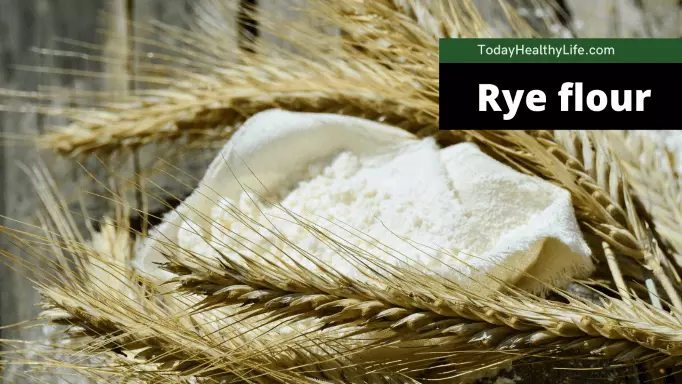
Another notable oat flour substitute for oat flour is rye flour. Rye flour usually comes from the ryegrass grain. Rye is a member of the wheat family and is also very similar to barley.
128 grams of rye flour provides 416 calories with 88g of carbohydrates, 20g of protein, 30g of dietary fiber, 918 mg of potassium, and so on. Compared to whole-grain wheat flour, rye flour is rich in dietary fiber. Consequently, it is a very beneficial flour for good digestion that can lower the risk of constipation by stimulating bowel function.
Besides, rye flour contains a lower level of glycemic content which reduces the risk of developing type-2 diabetes. Moreover, it prevents increasing LDL cholesterol in the blood. Also, this flour plays a great role in reducing heart diseases like oat flour. Another most important thing that rye flour can do is help to prevent forming gallbladder stones.
Unlike oat flour, rye flour is not gluten-free. It contains secalin which is commonly known as gluten protein. However, the amount of gluten content is very low, so there is no health risk with it. If you want a gluten-free diet, you can skip this flour.
Also read: Rye Bread Calories & Nutrition | Does it make you fat?
Buckwheat flour
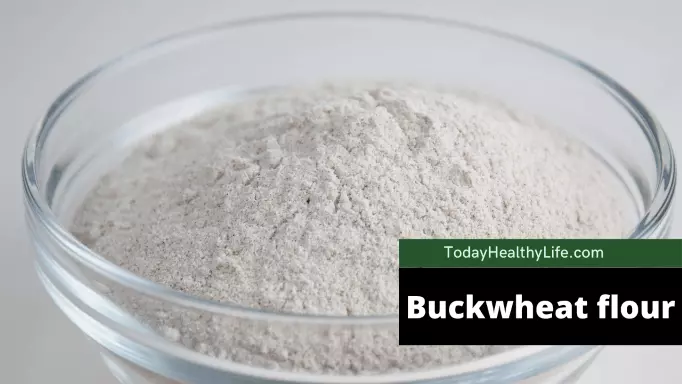
Buckwheat flour can also be an astonishing substitute for oat flour. By the name buckwheat, you may think it is closely related to wheat. But they are completely different from wheat. You may be surprised to know that buckwheat is an extremely nutritious grain-like seed.
People are using buckwheat flour for making traditional noodles, pancakes, and unleavened bread. This flour is very famous in Asia, Europe, and America for its unique taste and unbelievable health benefits.
Buckwheat is naturally gluten-free. So, it is very suitable for those people who want a gluten-free substitute for oat flour. Furthermore, buckwheat boosts heart health, improves digestion, controls diabetes, and helps to lose weight.
Gluten-free oat flour
Oat is naturally gluten-free. So, if you want to get gluten-free oat flour, you have two options in front of you. Firstly, you can buy a branded gluten-free oat flour. And secondly, you can make oat flour at home on your own.
In this part, we will guide you step by step so that you can make gluten-free oat flour. So, without any further ado, let’s our things get started.
Step-1: Firstly, take some gluten-free rolled oat grains into a blender. Then blend it thoroughly.
Step-2: In this step, after a few rounds of blending, you can see that some oats are still whole and some turn into flour.
Step-3: Keep blending until it turns into powder.
Step-4: In this step, your oat flour is ready for making any recipe. Because you have soft and smooth flour with little flakes. But if you want to avoid those flakes of oats, you can separate flour by using a sifter.
Also read: Is oat milk gluten free? How to find & how to make it at home?
The side effect of oat flour
Every food that we consume has some more or less side effects. There is no exception for oat flour. Most importantly, oats are gluten-free grains that cause no harm when you keep oat flour to a balanced diet.
On the other hand, if you consume excess oat flour every day you may gain weight. Also, it may increase LDL cholesterol, bad cholesterol, in your body rapidly and it can cause a great risk of cardiovascular diseases consequently.
Moreover, some people face allergic reactions after having oats. If you have an allergy to oats, then you should avoid oat flour. Furthermore, some people experience intestinal gas after eating oat flour-made food.
Conclusion
We hope that you can now realize that you have so many options for an oat flour substitute. You can choose your flour according to your taste and convenience. All oat flour substitutes that we have described are gluten-free and completely healthy for your body. So, without having any doubt, pick the suitable one and bake your favorite goods.
